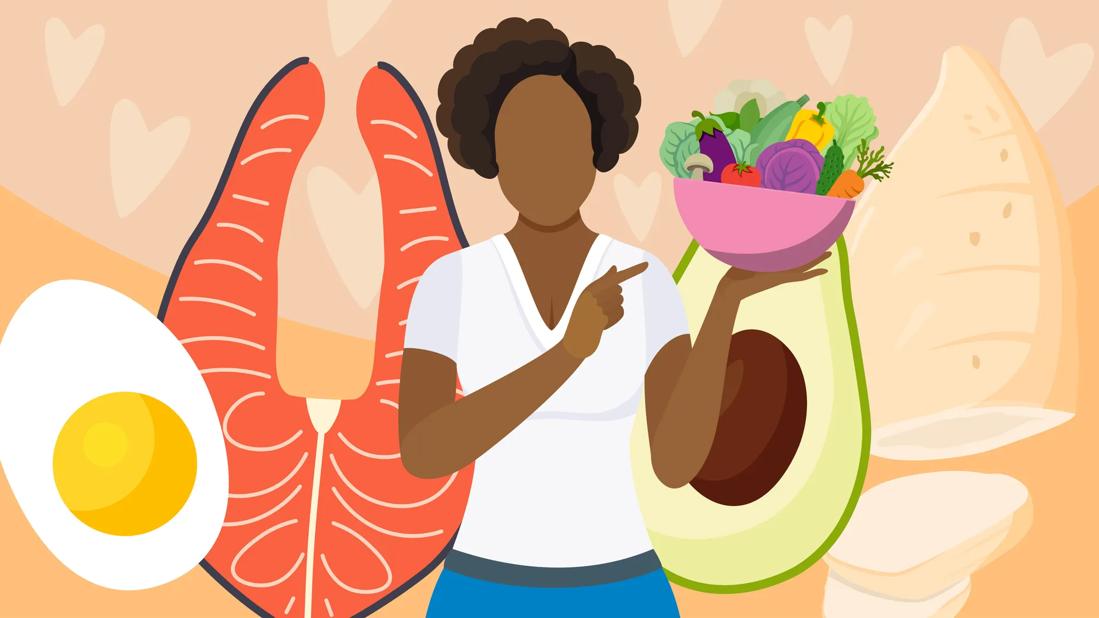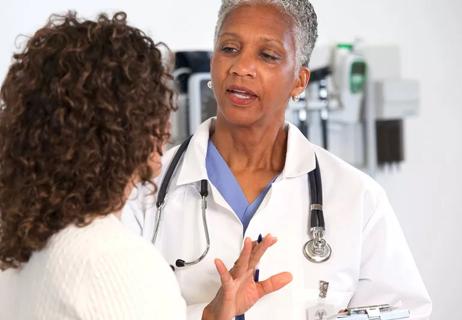Eating well can help reduce inflammation when you have endometriosis

Heavy periods, pain, nausea ... the discomforts of endometriosis can be distressing, debilitating and even disabling. And they can majorly interfere with your day-to-day life.
Advertisement
Cleveland Clinic is a non-profit academic medical center. Advertising on our site helps support our mission. We do not endorse non-Cleveland Clinic products or services. Policy
You may have heard that eating certain foods (and avoiding others) can help manage your symptoms. Some people may go so far as to tell you that overhauling your diet is the key to feeling your best.
But is following an endometriosis diet really the solution? According to gynecologic surgeon Cara King, DO, it’s one part of the picture.
Dr. King shares how eating well can help manage endometriosis as part of your overall management plan.
Video content: This video is available to watch online.
View video online (https://cdnapisec.kaltura.com/p/2207941/sp/220794100/playManifest/entryId/1_7avap8y5/flavorId/1_5f3sgelj/format/url/protocol/https/a.mp4)
Certain foods can make a difference when you have endometriosis.
An endometriosis diet is an eating plan focused on improving symptoms by lowering inflammation that comes from living with endometriosis.
“Endometriosis is exceptionally inflammatory. Anything that’s going to decrease that inflammation is going to be helpful,” Dr. King says.
But a healthy diet is just one element of managing endometriosis.
“Too often, people with endometriosis are told that managing their condition is on them. That if they just ate healthier, they’d be better,” Dr. King acknowledges. “Diet can help. But proper treatment and management go beyond what you eat.”
If eating a healthier diet is part of your strategy to improve endometriosis, then whole, natural foods are a better bet than processed ones.
“Everyone can benefit from a diet that emphasizes lean protein, healthy fats, whole grains and lots of fruits and vegetables,” Dr. King notes. “And if you have endometriosis, it can make a difference in how you feel.”
Advertisement
Dr. King shares advice on what to eat and what to avoid.
High estrogen levels can make endometriosis symptoms worse. Fiber can help your body eliminate excess estrogen.
How? Fiber helps you poop. And when you poop, it gives your body a chance to get rid of extra estrogen.
Aim for about 35 grams of fiber each day. How do you know if you’re getting enough?
“If you’re pooping once a day, you’re probably on track,” Dr. King says.
Some people can benefit from fiber supplements. But you can also up your intake by eating fiber-filled foods, like:
Pro tip: Increase your fiber intake gradually. Adding too much at once can make bloating, gas and other digestive discomforts worse. Drinking plenty of water can also help to minimize these side effects.
Omega-3 fatty acids can calm inflammation from endometriosis. Good food sources of omega-3s include:
Monounsaturated fats also have anti-inflammatory powers. They’re found in:
Magnesium can help ease muscle cramps, including menstrual cramps that can come with having endometriosis. Magnesium-rich foods include:
Zinc helps regulate your menstrual cycles, which is important for hormonal balance.
It can help your body ovulate (release an egg). When you ovulate, you produce progesterone, which balances out excess estrogen and can help fight the effects of endometriosis.
Animal products are some of the foods that are highest in zinc. That includes foods like:
If you follow a vegetarian or vegan diet, ask a healthcare professional about good sources of zinc for you and whether you could benefit from a zinc supplement.
Processed and packaged foods aren’t healthy for anyone. And if you have endometriosis, cutting back on your intake can help.
Advertisement
Processed foods are the ones that come in a box or bag and have long lists of ingredients. They don’t have the vitamin and mineral content you’ll find in fresh foods. Instead, they tend to be chock-full of things that may worsen inflammation and stir up endometriosis symptoms. That includes ingredients like:
So, when you fill up on chips, cookies, microwave meals and more, you’re getting a big helping of inflammation-causing foods that can make endometriosis symptoms worse. And you leave less room in your belly for the nutrients your body needs.
Some people with endometriosis find that certain foods or drinks make their symptoms worse. And they’re not the same for everyone.
“What bothers one person may not bother someone else,” Dr. King clarifies. “I recommend keeping a food journal so you and your provider can identify any triggering foods. Note what you’re eating and any symptoms you’re experiencing. Share it with your team at your next appointment so, together, you can find patterns and consider that as part of your treatment plan.”
Common triggers for people with endometriosis can include things like:
Advertisement
Your diet didn’t cause endometriosis. And changing what you eat won’t cure it. But a healthy diet can still help you better manage your condition.
“Eating well can go a long way toward helping you keep your body healthy overall, and that can help you feel your best,” Dr. King emphasizes.
“But it’s just one part of the plan. It’s also important to talk with your provider about other ways to manage your symptoms, care for your mental health and address all the ways in which endometriosis is affecting your well-being. Your experience is valid, and you deserve a comprehensive treatment plan.”
Advertisement

Sign up for our Health Essentials emails for expert guidance on nutrition, fitness, sleep, skin care and more.
Learn more about our editorial process.
Advertisement

This chronic condition most commonly causes pelvic pain and severe cramping during periods, but it can bring other types of pain symptoms, too

The most comfortable sex positions minimize deep penetration

A painful, swollen abdomen from endometriosis may be managed with dietary changes

Keto can reduce blood sugar, but that doesn’t mean it’s right for everyone

People with PKU need to avoid high-protein foods, like meat, dairy, legumes and whole grains

It’s important to angle it toward your rectum or back, along the natural curve of your vaginal canal

Alternating between periods of eating and fasting may benefit your health

This plant-based eating plan focuses on lowering cholesterol, making it a great companion to the Mediterranean diet

Even small moments of time outdoors can help reduce stress, boost mood and restore a sense of calm

A correct prescription helps your eyes see clearly — but as natural changes occur, you may need stronger or different eyeglasses

Both are medical emergencies, but they are very distinct events with different causes